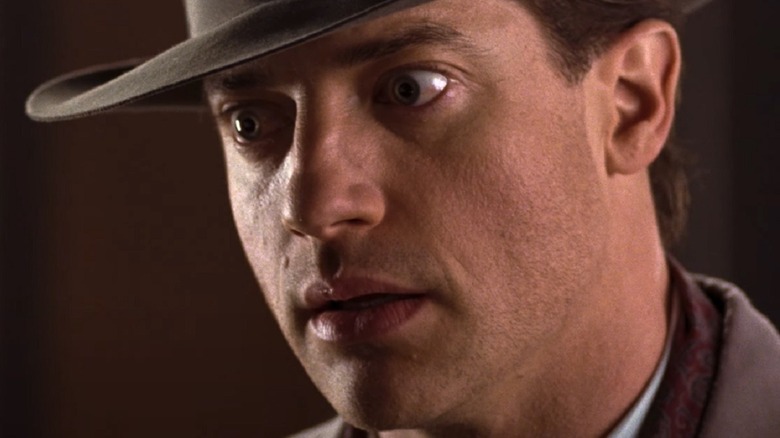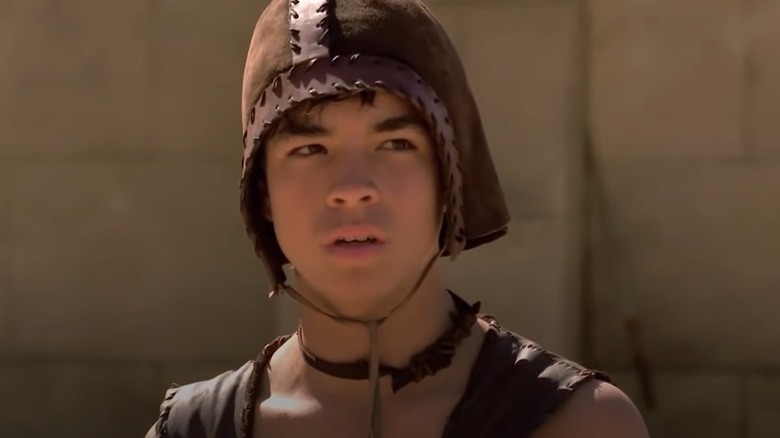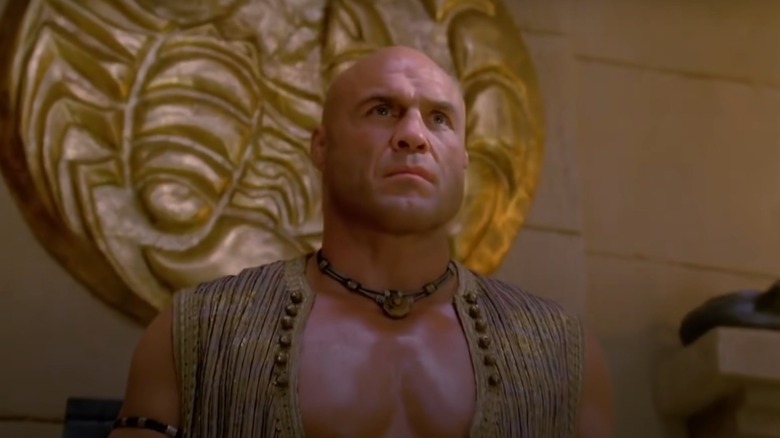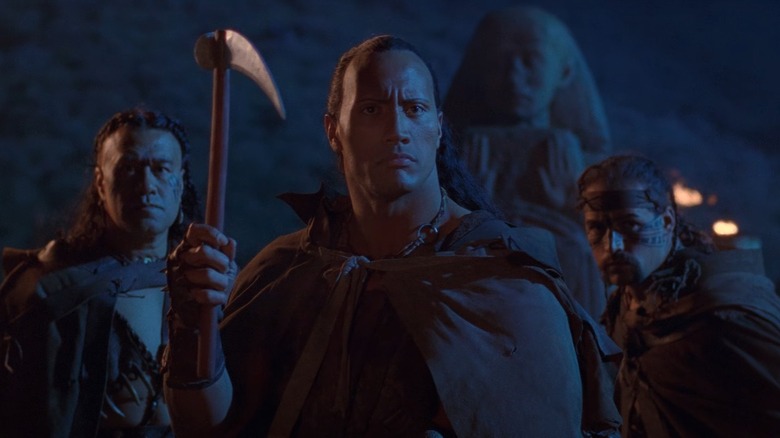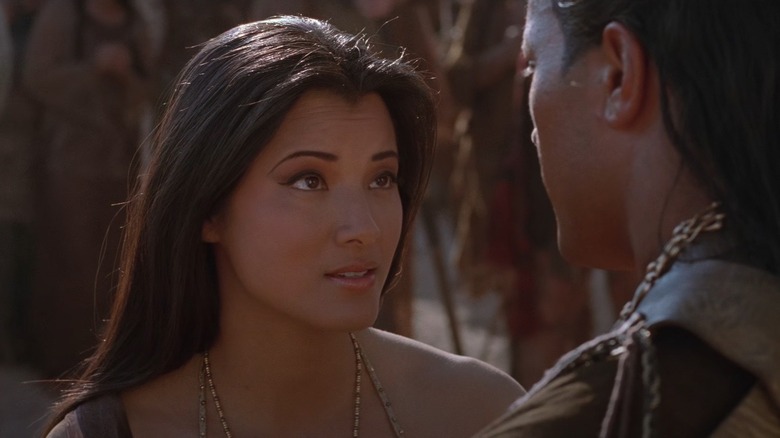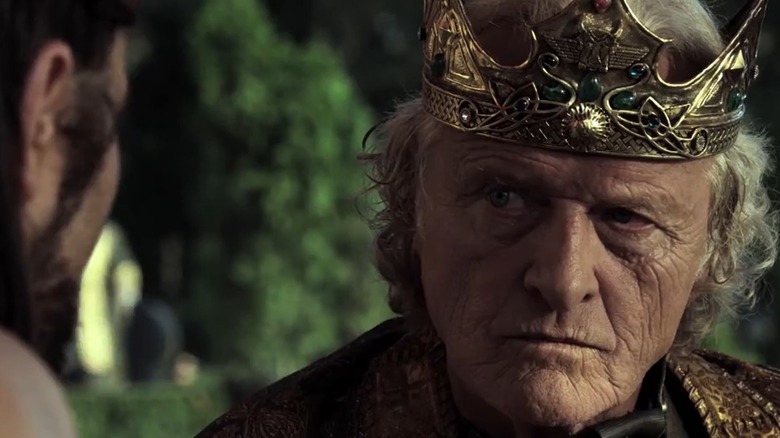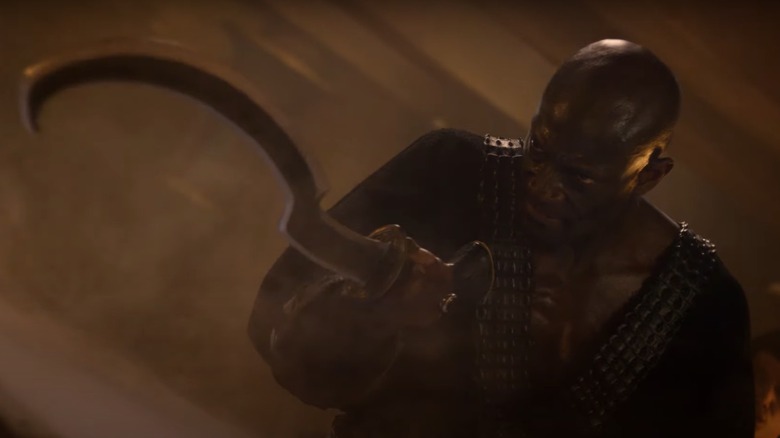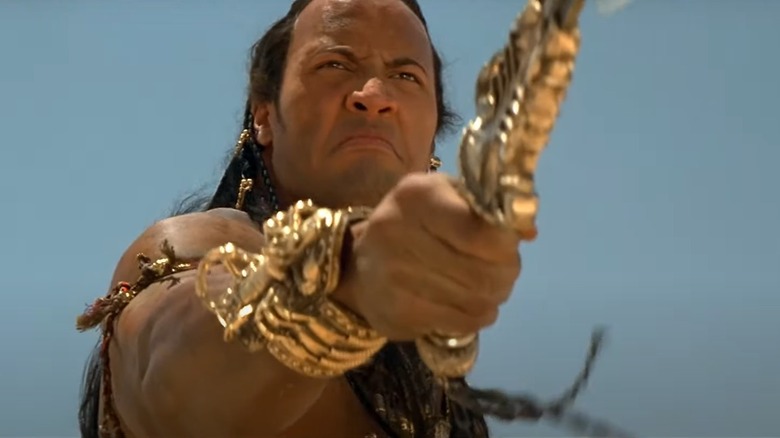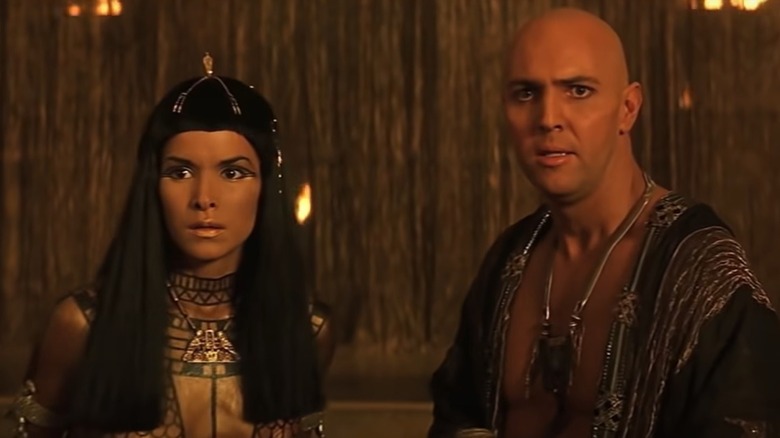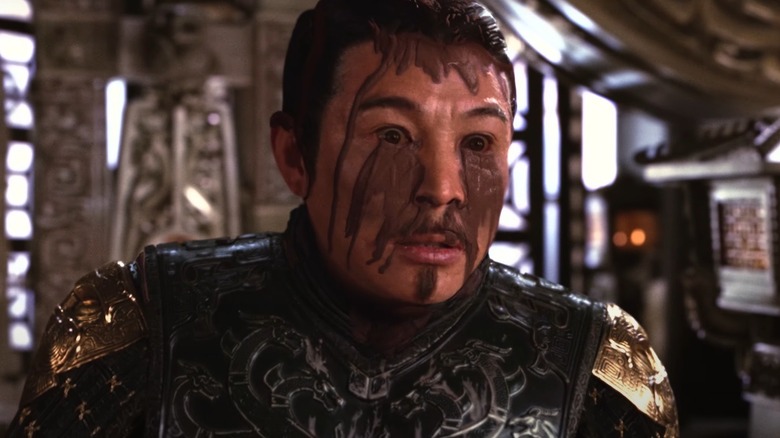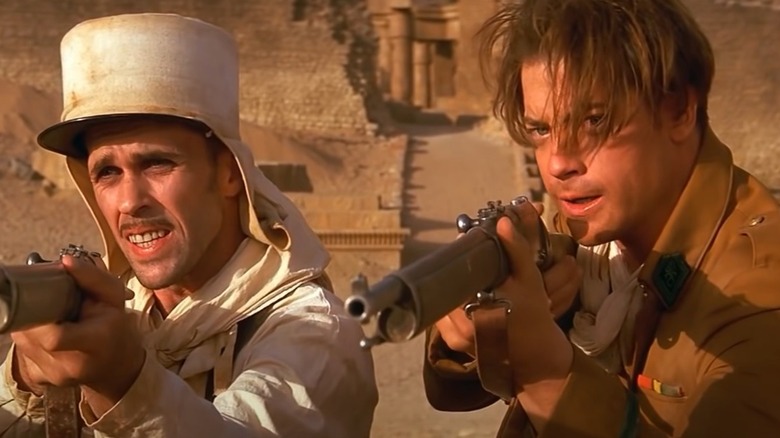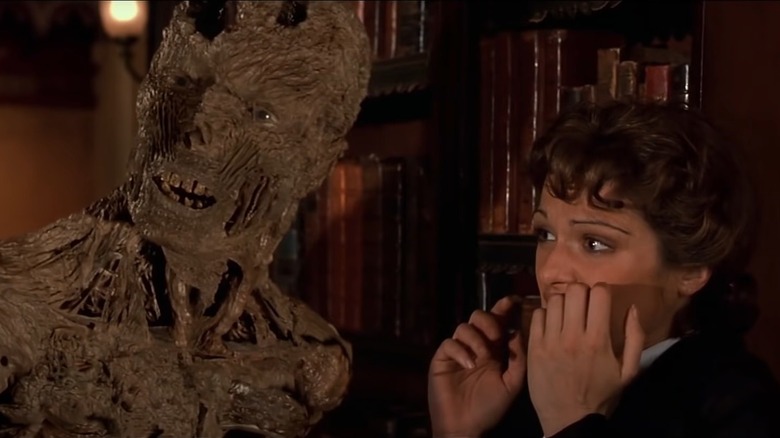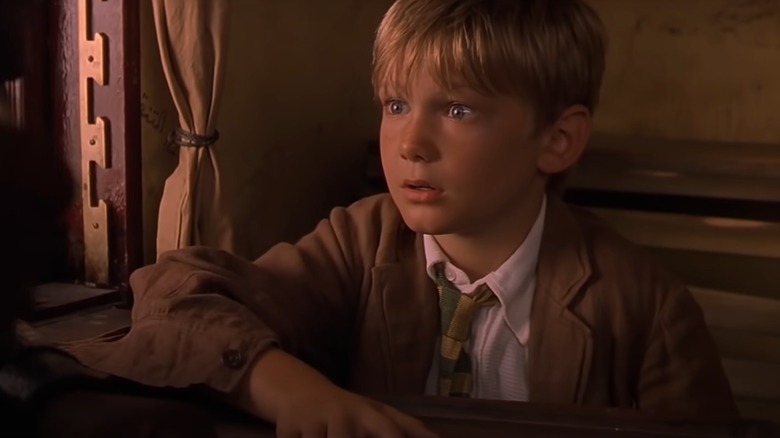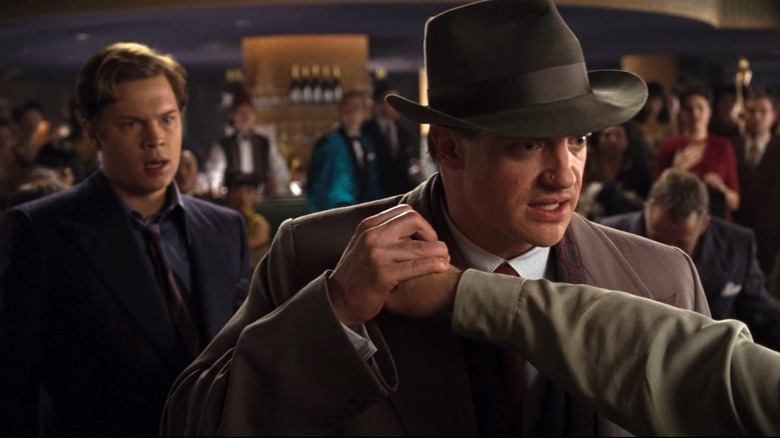The Entire Timeline Of The Mummy Franchise Explained
Almost 20 years after Steven Spielberg brought feel-good action movies back to the big screen with his pulpy classic "Raiders of the Lost Ark," Brendan Fraser channeled Indiana Jones in 1999's "The Mummy," a remake of the classic Universal film of the same name. The two movies are similar in myriad ways — a no-nonsense hero, an infectious sense of exploration, and prequels that you probably forget existed (we're looking at you, "The Young Indiana Jones Chronicles"). Fraser played the gun-slinging Rick O'Connell in three films, but we know more about the Scorpion King, the villain played by Dwayne Johnson in 2001's "The Mummy Returns." The character has been the focus of several films, all of them set before Rick met Evelyn "Evie" Carnahan (played by Rachel Weisz in "The Mummy" and "The Mummy Returns," and Maria Bello in "The Mummy: Tomb of the Dragon Emperor").
The franchise plays out across thousands of years and the dates can get a little murky in places, but have no fear: from ancient Egypt to post-war China, we're here to unravel the entire "Mummy" timeline.
The Black Scorpions
The story of "The Mummy" franchise begins over 5,000 years before Rick O'Connell battled the titular Egyptian priest Imhotep (Arnold Vosloo) in the 1920s. Around the year 3087 BC, a boy named Mathayus — an Akkadian child destined to become the man known all over the ancient world as the Scorpion King — is a 13-year-old with ambitions of becoming a Black Scorpion. This elite unit served the Kingdom of Akkad and protected its leader from harm, though it was far from a glamorous life. Mathayus' father, the former mercenary and respected warrior Ashur, forbid his son from becoming a Black Scorpion, but he decided to try out anyway.
When the trainer of the Scorpions, the battled-hardened Sargon (played by former UFC champion Randy Couture), discovered that Mathayus' female friend Layla had snuck into the training sessions in disguise, he wasn't happy. He told the girl that there were no female Scorpions and expelled her, which angered Mathayus. The youngster lashed out at Sargon, and Ashur was forced to defend his son from him. King Hammurabi stepped in to stop the scuffle before someone got hurt, but the chastened Sargon swore revenge on Ashur. Using his dark magic, Sargon murdered Mathayus' dad in a cowardly attack.
The rise and fall of Sargon
Seven years after the murder of his father, a 20-year-old Mathayus finished his training and became a fully-fledged Black Scorpion. King Hammurabi was no longer around, however. The ruler of Akkad had been killed and usurped by Sargon, meaning Mathayus was bound to serve him instead. When Sargon ordered Mathayus to kill his younger brother, Noah, he broke his vows and they attempted to flee together. Sargon wouldn't let that happen, however — he shot a cursed arrow at them, which followed them through the streets and killed Noah. The now grown-up Layla confirmed to Mathayus that Sargon was using dark magic, meaning they would need a special weapon to defeat him.
Leaving Akkad behind, Mathayus boarded a ship to Egypt to search for the Spear of Osiris (more on that later), believing it would help him kill Sargon. He changed his plan after meeting the Greek poet Aristophanes ("Westworld" star Simon Quarterman), who informed Mathayus that what he really needed was the Sword of Damocles. The rogue warrior journeyed to the Underworld to retrieve the blade, and, after burning off his Black Scorpion tattoo with it, he used the legendary weapon to take revenge on the man that killed his father and brother.
The last of the Akkadians
Akkad quickly fell into ruin after the reign of the evil usurper Sargon. By 3077 BC, there were only three Akkadians left: Mathayus, his half-brother, Jesup, and their friend, Rama. They earned a living as mercenaries in the years following the collapse of Akkad, gaining a fearsome reputation. They were not quite as feared as the great swordsman and warlord Memnon, however. Memnon had cut a bloody path across the known world, using the predictions of a sorcerer named Cassandra to stay one step ahead of his enemies. In a last-ditch effort to stop him, King Pheron of the free tribes hired the last Akkadians to kill the sorcerer.
The Akkadians successfully located Cassandra, but Jesup and Rama were killed by Memnon's men, who were tipped off by King Pheron's turncoat son. Mathayus managed to escape with his life and the sorcerer, who, it turned out, was an unwilling accomplice to Memnon's conquest. She used her magic to save Mathayus from an arrow dipped in scorpion venom, but it changed him forever.
"The blood of the scorpion will always run through his veins," said Cassandra. She predicted that he would likely die if he faced Memnon, but Mathayus beat the odds, defeating the warlord and — by the laws of Memnon's great city — becoming the new ruler of Gomorrah. The city's troops dubbed him the Scorpion King.
The Scorpion King loses his queen
Mathayus married Cassandra after they took down Memnon, and (as the sorcerer predicted at the end of 2002's "The Scorpion King") they enjoyed a period of peace and prosperity, but (as she also predicted), it would not last. "Nothing lasts forever, my king," she told him, foreshadowing her own death. When we next caught up with Mathayus in 2012's "The Scorpion King 3: Battle for Redemption," we learned that Cassandra was among the many who perished from a deadly plague that brought his kingdom to its knees. Mathayus returned to his life as a mercenary and found himself in the employ of another ruler.
King Horus of Egypt (a scenery-chewing Ron Perlman) had a job for Mathayus: to stop his upstart younger brother, Talus, who was planning to usurp him with magic. Talus had stolen the Black Book (aka the Book of the Dead, which pops up several times in the "Mummy" timeline) and brought three legendary warriors back to life to help make his dream a reality. Mathayus traveled to the Far East to face Talus, who had taken the seat of a king named Ramusan as his own. He defeated one of the resurrected warriors and, after bringing down Talus, the other two bowed down to him.
The crown of Lord Alcaman
Years after taking out Talus, Mathayus got a new job from King Zakkour of Al-Moraad (late "Blade Runner" bad guy Rutger Hauer). He was sent to the palace of Skizurra to find and acquire an artifact known as the Urn of Kings, which he did, but not without a fight. During the scuffle, his apprentice Drazen proved himself to be a traitor who was after the Urn. Drazen took the Urn back to his homeland, the northern kingdom of Norvania, and presented it to his father, King Yannick. Drazen's dad knew that the Urn wasn't the real treasure, it was what was inside it: the Golden Key of Lord Alcaman. The key was the only way to retrieve Alcaman's crown, which gave the wearer unimaginable power.
King Zakkour sent Mathayus to Norvania to engage in peace talks with King Yannick, who took a shining to the Akkadian. Drazen decided to assassinate his own father with scorpions in an attempt to incriminate Mathayus, but Yannick didn't buy it: with his final act, he gave the key to Mathayus. Drazen was able to steal the key back, but not for long. Mathayus figured out the location of the crown via the inscription on the key, but, after witnessing its power firsthand, reported back that it was just a myth and locked it away again for the good of humanity.
The Fang of Anubis
The last adventure the Scorpion King would go on before his ill-fated assault on Thebes, Mathayus teamed up with a female warrior named Tala in 2018's "Scorpion King: Book of Souls." The film pits Mathayus against Tala's brother Nebserek, who has raided the tomb of the ancient king Memtep to acquire the Fang of Anubis. The sword was created when Memtep made a pact with the dark god, and he used it to slay many — the names of those who died by its blade were recorded in the titular Book of Souls. Nebserek planned on using it to rule the world, but that wasn't the only thing on his to-do list: he also wanted the Scorpion King dead.
Mathayus had been working as a blacksmith in the years since we last saw him, making tools for farming rather than instruments of war. His status was still legendary, however, and Nebserek would not risk his enemies uniting behind him. The only way to neutralize the Fang of Anubis was to use it to stab the Book of Souls, but that became complicated when Mathayus learned that the book was not actually a book, but a person. Memtep's daughter was the living embodiment of the book, and she ultimately sacrificed herself to break the curse and free the trapped souls.
The Battle of Thebes
After years of trying to avoid violence, losing so many friends and loved ones took its toll on Mathayus. By the year 3067 BC, he had resumed the title of Scorpion King and assembled a massive army, intent on taking over the known world and imposing his rule. As seen in the prologue to "The Mummy Returns," he led an assault on the great city of Thebes but failed to take the city. After a brutal, bloody campaign that lasted for seven years, he and his army were defeated and driven into the sacred desert of Ahm Shere.
Under the blistering sun, his men began dropping like flies until only Mathayus himself remained. Alone, angry, and desperate, he called on Anubis and made him an offer: grant the power to defeat his enemies once and for all, and he could have his soul. Anubis accepted. An oasis sprang up around Mathayus, saving his life. Anubis gave him command of his army and he made easy work of those who defied him, taking Thebes with little effort. As soon as the city fell, however, Anubis collected the debt. The Scorpion King was taken to the Underworld, now bound to serve the dark god.
Imhotep's affair with Anck-Su-Namun is discovered
Many years later — in 1290 BC, to be exact — Pharaoh Seti I's High Priest Imhotep entered into a secret affair with his lord's concubine, Anck-Su-Namun. She spent her days painted with an intricate gold pattern, one that easily smudged: if anyone touched her, Seti would know. When he noticed that she had been touched and began to grill her about it, Imhotep acted. He and Anck-Su-Namun stabbed the pharaoh to death as his daughter, Nefertiri, watched on from an adjacent balcony. Nefertiri alerted her father's guards, and, rather than be captured, Anck-Su-Namun committed suicide.
Imhotep was spirited away by his followers and made it his mission to resurrect his lover. He stole the Book of the Dead, but the Medjai stopped him before he could complete the ritual. He was sentenced to the most brutal punishment of the day: the Hom-Dai. The victim's tongue was cut out and they were mummified alive, with a bunch of flesh-eating scarab beetles thrown into the sarcophagus for good measure. It was "the worst of all ancient Egyptian curses," said Ardeth Bay, the leader of the Medjai. "One so horrible, it had never before been bestowed." The Hom-Dai was never used because it came with risks: if the victim was ever resurrected, they would bring with them the Ten Plagues of Egypt and would be almost impossible to kill.
The origins of the Terracotta Army
In the year 200 BC, Emperor Han of Ancient China set in motion the events that would play out onscreen in "The Mummy: Tomb of the Dragon Emperor." Han (Jet Li) wanted to live forever, so he sought the help of the powerful sorcerer Zi Yuan (Michelle Yeoh). The sorcerer was sent on a mission to retrieve some magic scrolls that would help her grant the Emperor's wish, with Han's top general, Ming Guo, watching over her. They were gone for some time, and, after they opened up to one another, they fell in love. This didn't sit well with Han, who believed that Yuan belonged to him and him alone.
When their affair was discovered, Guo was put to death in horrific circumstances: Han had his general ripped apart by horses, torn limb from limb. Having gotten everything he needed from Yuan, Han then stabbed the sorcerer, which would be the last thing he did for many years. What Han didn't realize is that Yuan had taken out an insurance policy against such a thing: she secretly cursed the Emperor and his army, so that if he ever harmed her, they would all be turned into statues. Clay began pouring from Han's eyes after he plunged his blade into the sorcerer, and his men became the famous Terracotta Army.
The Battle of Hamunaptra
The descendants of Pharaoh Seti I's sacred bodyguards spent years watching over Hamunaptra (the resting place of the treacherous priest Imhotep), making sure that nobody brought the cursed one back to life. Humanpatra had become a legend in that time, with many doubting it even existed. Colonel Guizot of the French Foreign Legion believed in it, however, so much so that he marched his men through Libya and into Egypt to look for it. It was a testing journey, but they eventually discovered the fabled City of the Dead and set up camp there.
In 1923 AD, an army of Tuareg warriors mounted an attack on the foreign occupiers and Guizot fled, leaving Rick O'Connell (an American orphan who joined the Legion while drunk) in charge of the outfit. He displayed great bravery during the Battle of Hamunaptra, but his men were overwhelmed. O'Connell was cornered and was on the verge of being killed when his Tuareg pursuers became spooked and fled. Watched by Ardeth Bay and his Medjai warriors (who believed that the American would die from exposure), he set off into the desert alone.
The return of Imhotep
Against the odds, Rick O'Connell managed to make it back to civilization, but his luck didn't improve much in the years following Hamunaptra. In 1926, a British librarian and Egyptologist named Evelyn Carnahan sought him out in prison after her brother, the light-fingered Jonathan, acquired (or, in truth, stole) a map to Hamunaptra from him. Rick was seconds from death, but Evelyn saved his life by promising the hangman a cut of the treasure. The pair fell in love as they traveled to the City of the Dead together, and their bond was tested after they discovered Imhotep's sarcophagus.
After accidentally bringing the cursed priest back to life by reading from the Book of the Dead (discovered by a group of doomed archaeologists from America), Evelyn became important to Imhotep. The resurrected villain planned on finally bringing Anck-Su-Namun back from the dead, and Evie was to be his human sacrifice. He almost succeeded, but, against the odds, Rick, Jonathan, and Ardeth defeated the creature. They used the Book of Amun Ra to make Imhotep a mortal man and Rick stabbed him in the gut. His last words were, "Death is only the beginning," which, in his case, would turn out to be true.
The Year of the Scorpion
Rick and Evie settled in London after the events of Hamunaptra, apparently using the treasure they (unknowingly) brought back to buy a huge mansion in the English capital. Not long after their escape, they had a son, Alex. He is eight years old when we re-join the O'Connells in "The Mummy Returns," in which his parents discover the Bracelet of Anubis, formerly belonging to the Scorpion King. It's 1933, which, as Evelyn knows full well, is the Year of the Scorpion: it's been 5,000 years since the ancient king was taken to the Underworld, and he is prophesied to return.
It turns out the bracelet is a map to the Scorpion King's resting place, but Alex didn't know this when he put it on. From that moment, he had seven days to enter the golden pyramid at the center of Am-Shere. If he didn't make it in time, his life force would be sucked from his body. Alex was kidnapped by an Egyptian cult that planned on resurrecting Imhotep and helping him defeat the Scorpion King, giving him control of the Army of Anubis and, therefore, the power to conquer the world. After saving his son, Rick used the Spear of Osiris to defeat the Scorpion King himself. Both he and Imhotep were about to be dragged to the Underworld, but Evie saved Rick. The resurrected Anck-Su-Namun, on the other hand, abandoned Imhotep. Heartbroken, he allowed himself to be taken, forever leaving behind the mortal world.
Rick and Evie pass the baton to Alex
It's 1946, and Alex O'Connell is all grown up. He takes after his parents in more ways than one: He's a keen explorer, and he has terrible luck when it comes to resurrecting ancient evils. Alex discovered the legendary tomb of the ancient Chinese emperor Han and believed him to be nothing more than a statue. His archaeology professor Roger Wilson knew better, however.
Wilson was secretly working with the people who funded the trip, a rogue faction of the Chinese military that wanted to bring the tyrannical emperor back to life. Rick and Evie had been working as spies for the British government during World War II, and they were asked to carry out one last mission: return a priceless artifact called the Eye of Shangri-La to China. Unbeknownst to them, the eye was the key to resurrecting the emperor, and, after it was taken from them, Han was brought back to life.
In Shanghai (where Jonathan had opened an Egyptian-themed club named Imhotep's), they teamed up with Alex and Lin, a local girl who helped them locate Shangri-La in the Himalayas. She turned out to be the daughter of Zi Yuan, who is still alive thanks to the waters of the mystical mountain utopia. They both sacrificed their immortality to bring back General Ming's army, who battled Han's forces. It was good old Rick who ultimately stopped the emperor, however, killing him with a cursed dagger.
